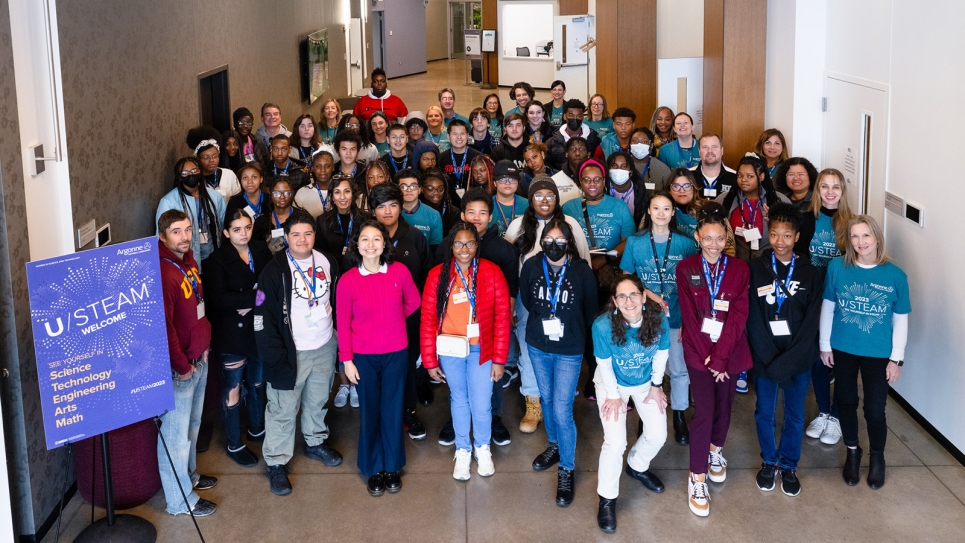
Forty 10th- and 11th-grade students from two Chicago Public Schools attended the U/STEAM event at Argonne on Nov. 2, 2023. (Image by Argonne National Laboratory.)
Forty 10th- and 11th-grade students from Chicago Public Schools recently visited Argonne for the U/STEAM event.
Think back to high school and how it might have shaped your passion for science if you had the opportunity to engage with cutting-edge technology and scientific experts firsthand. Students from the Chicago area had the chance to do so at the U.S. Department of Energy’s (DOE) Argonne National Laboratory’s See Yourself in STEAM (U/STEAM) event.
Argonne held the event in November 2023, welcoming to the lab 40 10th- and 11th-grade students from groups that are underrepresented in science, technology, engineering and mathematics (STEM).
Argonne’s Women in Science & Technology (WIST) employee resource group hosted the event in collaboration with Argonne’s Institutional Partnerships team, the Argonne African-American employee resource group and the Argonne Hispanic/Latino Club employee resource group. The event, which catered to students from Chicago Public Schools (CPS), brought together professional staff — especially those who belong to underrepresented groups in STEM — from across the lab to help the students see themselves working in STEAM, which includes the arts.
High school students from Hyde Park Academy and Roberto Clemente Community Academy heard keynote addresses and engaged with Argonne staff through expo visits, including the Center for Nanoscale Materials (CNM) — representing science; Center for Energy, Environmental, and Economic Systems Analysis (CEEESA) — technology; EcoCAR — engineering; Creative Services — arts; and the Argonne Leadership Computing Facility (ALCF) — mathematics. They particularly enjoyed interacting with physical models of scientists’ devices. CNM and ALCF are DOE Office of Science user facilities.
“I really enjoy the opportunity to interact with students. It’s something I miss from when I was a professor before working at Argonne,” Argonne researcher Ralph Muehleisen said. As the chief building scientist and buildings and industrial technologies group leader in CEEESA, Muehleisen demonstrated an acoustic camera that finds energy leaks in buildings by measuring the acoustic pressure and velocity without touching the source. “When they see something like this, they feel, ‘Yeah, this is actually something I could do myself.’”
The opportunity was a transformative one, said Hyde Park Academy Assistant Principal Joshua VanderJagt, who has partnered with Argonne for many STEM programs as part of a shared commitment to advancing STEM at schools on the South Side of Chicago.
“U/STEAM presented a unique opportunity for students to immerse themselves in a dynamic STEM environment, offering exposure to cutting-edge research facilities, diverse perspectives and collaborative networking,” VanderJagt said. “STEM education is crucial, as it equips students with the skills needed for a technology-driven world. U/STEAM had a transformative impact on students, broadening their perspectives on STEM. U/STEAM served as a catalyst to shape students’ career aspirations and instill a lifelong curiosity for STEM disciplines.”
U/STEAM also included a poster session from the Argonne Afro-Academic, Cultural, Technological & Scientific Olympics (ACT-SO) High School Research Program. The high school students in the ACT-SO program were excited to showcase their hard work and encourage the CPS students attending U/STEAM to participate in similar programs that inspire future science leaders.
“It was very exciting listening to all of them [Argonne researchers and staff], because I think one day I can see myself doing one of those fields,” said Fatmata Bah, a student at Hyde Park Academy. Bah also appreciated the ACT-SO presentations. “It was very fun looking at them, because it’s inspiring to see young people doing something that they love and will inspire others, too.”
About Argonne’s Center for Nanoscale Materials
The Center for Nanoscale Materials is one of the five DOE Nanoscale Science Research Centers, premier national user facilities for interdisciplinary research at the nanoscale supported by the DOE Office of Science. Together the NSRCs comprise a suite of complementary facilities that provide researchers with state-of-the-art capabilities to fabricate, process, characterize and model nanoscale materials, and constitute the largest infrastructure investment of the National Nanotechnology Initiative. The NSRCs are located at DOE’s Argonne, Brookhaven, Lawrence Berkeley, Oak Ridge, Sandia and Los Alamos National Laboratories. For more information about the DOE NSRCs, please visit https://science.osti.gov/User-Facilities/User-Facilities-at-a-Glance.
The Argonne Leadership Computing Facility provides supercomputing capabilities to the scientific and engineering community to advance fundamental discovery and understanding in a broad range of disciplines. Supported by the U.S. Department of Energy’s (DOE’s) Office of Science, Advanced Scientific Computing Research (ASCR) program, the ALCF is one of two DOE Leadership Computing Facilities in the nation dedicated to open science.
Argonne National Laboratory seeks solutions to pressing national problems in science and technology. The nation’s first national laboratory, Argonne conducts leading-edge basic and applied scientific research in virtually every scientific discipline. Argonne researchers work closely with researchers from hundreds of companies, universities, and federal, state and municipal agencies to help them solve their specific problems, advance America’s scientific leadership and prepare the nation for a better future. With employees from more than 60 nations, Argonne is managed by UChicago Argonne, LLC for the U.S. Department of Energy’s Office of Science.
The U.S. Department of Energy’s Office of Science is the single largest supporter of basic research in the physical sciences in the United States and is working to address some of the most pressing challenges of our time. For more information, visit https://energy.gov/science.